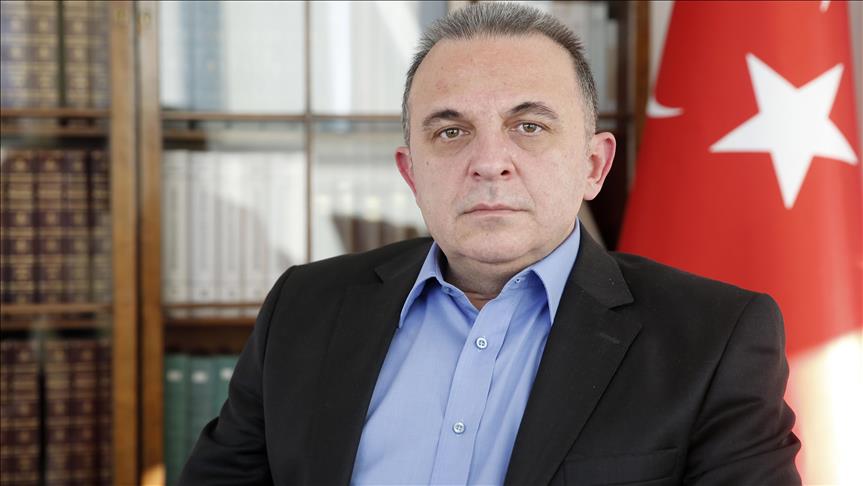 Turkish ambassador to Tel Aviv Kemal Okem, poses for a photo during an exclusive interview for Anadolu Agency (AA) in Tel Aviv, Israel on February 10, 2017 after Turkish Culture and Tourism Minister Nabi Avci's (not seen) visit to Israel. ( Daniel Bar On - Anadolu Agency )
Turkish ambassador to Tel Aviv Kemal Okem, poses for a photo during an exclusive interview for Anadolu Agency (AA) in Tel Aviv, Israel on February 10, 2017 after Turkish Culture and Tourism Minister Nabi Avci's (not seen) visit to Israel. ( Daniel Bar On - Anadolu Agency )
TEL AVIV, Israel
Turkey is now in talks with Israel with a view to bolstering cooperation in the fields of energy, trade and tourism, according to Turkish Ambassador to Israel Kemal Okem.
In an exclusive interview with Anadolu Agency on Friday, Okem voiced hope that the recent restoration of Turkey-Israel relations would lead to improved cooperation.
The two countries restored diplomatic ties last summer following a six-year hiatus. Relations were severed in 2010 after Israeli commandos killed 10 Turkish activists aboard a Gaza-bound aid ship in the Mediterranean Sea.
Syria
According to Okem, Turkey, Israel, Jordan and Saudi Arabia have all tried to contain the violence in Syria through a number of means, including Turkey’s Operation Euphrates Shield, which has sought to eliminate the terrorist presence in northern Syria.
The other three countries, for their part, have also tried to contain the crisis, both unilaterally and through coordination with others.
"For example, a dialogue mechanism has been established between Jordan and Israel since the crisis in Syria began," Okem said, noting that Turkey had asked Israel to establish a similar bilateral mechanism.
The Israelis, the ambassador noted, had reacted "positively" to the Turkish request.
Okem also stressed Turkish support for Syria's territorial integrity.
"We see similar concerns on the part of both Israel and Jordan," he said. "We all agree on the need to safeguard Syria's territorial integrity and national unity."
Regarding ongoing political sensitivities between Ankara and Tel Aviv, Okem said these sensitivities would be reduced once the two countries began discussing their respective "red lines" regarding their national security.
Palestine
Okem stressed, however, that the issue of Palestine remained one of Turkey’s primary regional concerns.
"Turkey's support for the Palestinian cause will continue," he asserted. "And Israel knows this."
He went on to reiterate Ankara’s support for a "two-state solution" to the dispute, with an independent Palestinian state -- based on 1967 borders -- and Jerusalem as its capital.
"This is in line both with international law and past UN resolutions," he said.
Okem emphasized that the issue of Palestine was one of three "pillars" of the ongoing normalization process between Turkey and Israel.
"The Gaza Strip continues to reel from an energy crisis," he said. "We are also trying to help the [Israeli-occupied] West Bank with a number of infrastructure projects, the largest of which is the Jenin Industrial Zone."
"We are currently talking to our Israeli counterparts regarding construction [of the industrial zone]," he added. "In Gaza, meanwhile, efforts remain ongoing to provide residents with energy -- especially electricity -- and water."
"In our discussions with the Israeli authorities, we have seen that they are also aware of the importance of these issues," the ambassador said.
The sustainability of Gaza’s social and economic life, Okem stressed, remained of paramount importance to Ankara.
Noting that Turkey was planning to eventually dispatch another humanitarian aid convoy to Gaza, Okem said the Israeli authorities had promised to help in this regard.
"People, however, cannot depend solely on aid deliveries," he pointed out, noting that viable trade and manufacturing sectors were essential to the strip’s social and economic survival.
Landmark visits, tourism
Earlier this week, Turkish Culture and Tourism Minister Nabi Avci traveled to Israel, becoming the first Turkish official to visit the Jewish state since relations were severed in 2010.
In a similar exchange last October, Israeli Energy Minister Yuval Steinitz paid a visit to Ankara.
And last week, senior Turkish and Israeli officials met in the Turkish capital to discuss regional developments and means of bolstering cooperation in the fields of energy, economy, culture and tourism.
"These were the first political discussions after a long time," said Okem. "The main topic of discussion was how to reap common benefits in areas such as trade, tourism and energy."
As a first step towards this end, he added, Ankara had asked Israel to ease visa restrictions with a view to promoting tourism from Turkey.
He pointed to Turkish exports of machines and spare parts to Israel, noting that Turkish technicians -- who had been invited by Israeli firms -- had been unable to obtain visas to visit the country.
During his visit to Israel last week, Avci had asked Israeli counterpart Yariv Levin to increase the number of Israeli tourists visiting Turkey on an annual basis to 600,000 -- a level unseen in recent years.
According to official Turkish figures, some 294,000 Israelis visited Turkey last year.
While in Israel, Avci attended the opening of the 23rd Mediterranean Tourism Expo in Tel Aviv -- the first time in six years for a Turkish official to attend the event.
Anadolu Agency website contains only a portion of the news stories offered to subscribers in the AA News Broadcasting System (HAS), and in summarized form. Please contact us for subscription options.

